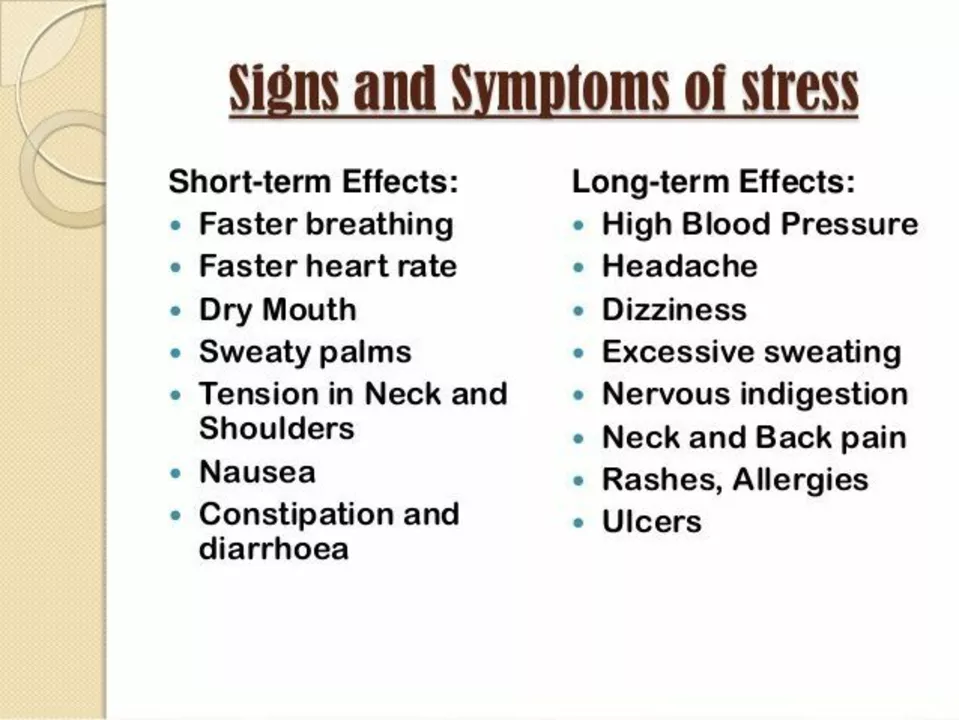Stress Relief Tips – Simple Ways to Reduce Anxiety Today
If your heart races, thoughts tumble, or you feel tense after a long day, you’re experiencing stress. It’s a normal reaction, but too much can hurt sleep, digestion, and mood. The good news? You don’t need a prescription or fancy gadget to calm down. Small, consistent actions can make a big difference.
Quick Stress‑Busters You Can Do Now
1. Deep breathing for 60 seconds. Sit upright, inhale through the nose for four counts, hold two, then exhale slowly for six. Repeat five times. This simple rhythm signals your brain to relax and drops heart rate within minutes.
2. Move your body. Even a brisk 5‑minute walk around the block flushes out adrenaline. If you can’t step outside, do a quick stretch: reach up high, then touch your toes. The movement releases endorphins that naturally boost mood.
3. Change scenery. Staring at a screen all day adds mental pressure. Look out a window, watch clouds drift, or simply stand near a plant. A visual break reduces the feeling of being trapped by thoughts.
4. Sip water mindfully. Dehydration can mimic anxiety symptoms. Drink a glass of water slowly, focusing on each sip. This tiny ritual grounds you and gives your body a quick reset.
Long‑Term Strategies for Lowering Stress
Build a routine. Consistency beats chaos. Set regular wake‑up and bedtime hours, schedule meals, and carve out 15 minutes each day for something you enjoy—reading, drawing, or listening to music. Predictable patterns tell your nervous system that life is under control.
Limit caffeine and sugar spikes. Those quick energy hits often end in crash mode, leaving you jittery and more stressed. Swap one coffee a day for herbal tea, and choose whole‑food snacks like nuts or fruit instead of sugary bars.
Practice gratitude. Write down three things you appreciated that day. It doesn’t have to be grand—a good cup of tea, a friendly smile, or finishing a task. Shifting focus from what’s wrong to what’s right rewires brain pathways toward positivity.
Get enough sleep. Aim for 7‑9 hours. If you struggle to fall asleep, dim lights an hour before bedtime, avoid screens, and try a short meditation or reading a physical book. Quality rest restores hormone balance that regulates stress responses.
Seek professional help when needed. Persistent tension, panic attacks, or sleeplessness lasting weeks deserve a chat with a doctor or therapist. They can guide you toward counseling, medication, or specialized techniques like CBT (cognitive‑behavioral therapy) that target the root of stress.
Remember, stress isn’t an enemy; it’s a signal that something needs attention. By using these quick fixes and building healthier habits, you turn that signal into a roadmap for better well‑being. Try one tip today, notice how you feel, then add another tomorrow. Small steps create lasting calm.
The Effects of Stress on Chronic Diarrhea: What You Need to Know
As a blogger, I've come across some interesting information about the relationship between stress and chronic diarrhea. It appears that stress can exacerbate this condition, as it triggers the release of hormones that can disrupt the normal function of the digestive system. This can lead to increased frequency and urgency of bowel movements, as well as abdominal pain and discomfort. It's crucial to manage stress through techniques like meditation, exercise, and proper sleep to improve overall gut health. If you suffer from chronic diarrhea, it's worth considering the role stress may be playing in your symptoms and seeking appropriate support.
read more